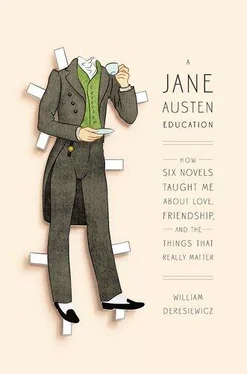Growing up may be the most remarkable thing that anybody ever does. One day we’re hitting our little brother over the head with a wooden duck, and a few days later we’re running a business, or writing a book, or raising a child of our own. How do we do it? The physical part is easy. A little food, a little exercise, and without ever having to think about it, we gradually find ourselves getting older, and taller, and hairier. But the other part—what about that? We come into the world as a tiny bundle of impulse and ignorance—how do we ever become fit for human company, let alone capable of love?
This, I discovered that summer, was what Jane Austen’s novels were about. Her heroines were sixteen or nineteen or twenty (people married young in those days, especially women). We followed them for a few weeks, or a few months, or a year. They started out in one place, and gradually—or sometimes, quite suddenly—they ended up somewhere else. They opened their eyes, let out a scream, took a few frantic breaths, then settled down and looked around at the strange new world in which they’d come to find themselves. They started out as girls, and day by day, page by page, before our very eyes, they turned into women.
It was the way they did it, though, that came as such a revelation to me. I was used to thinking about growing up in terms of going to school and getting a job: passing tests, gaining admissions, accumulating credentials, acquiring the kinds of knowledge and skills that made you employable—the terms in which my parents (and everyone else, for that matter) had taught me to think about it. If I had been asked to consider what kinds of personal qualities it might involve—which I doubt I ever was—I would have spoken of things like self-confidence and self-esteem. As for anything like character or conduct, who even used such words anymore? Their very sound was harsh to me: so demanding, so inflexible. They made me think of school uniforms, and nuns with rulers, and cold baths on winter mornings—all the terrible things that people used to inflict on their children.
But Austen, it turned out, did not see things that way. For her, growing up has nothing to do with knowledge or skills, because it has everything to do with character and conduct. And you don’t strengthen your character or improve your conduct by memorizing the names of Roman emperors (or American presidents) or learning how to do needlework (or calculus). You don’t do so, she believed, by developing self-confidence and self-esteem, either. If anything, self-confidence and self-esteem are the great enemies, because they make you forget that you’re still just a bundle of impulse and ignorance. For Austen, growing up means making mistakes.
That was the first lesson that Pride and Prejudice taught me. Elizabeth’s errors were not accidents she could have avoided; they were expressions of her character—in fact, of the very best parts of her character, that quickness and confidence for which I loved her so. You don’t “fix” your mistakes, Austen was telling me, as if they somehow existed outside you, and you can’t prevent them from happening, either. You aren’t born perfect and only need to develop the self-confidence and self-esteem with which to express your wondrous perfection. You are born with a whole novel’s worth of errors ahead of you. No, my father couldn’t save me from my mistakes, but maybe my mistakes could save me, from myself.
Elizabeth and I were young, and like most young people, we didn’t see how young we really were. If anything, people in their twenties have the opposite idea about themselves. When he was Elizabeth’s age, T. S. Eliot wrote poems about how terribly, terribly old he felt. It’s that sense, now that your childhood is over, of being ever so jaded and world-weary and wise. You put on a trench coat or dress in black, to show how over it you are. You say “Whatever” a lot, or “Duh!”—because it’s all just so boring and predictable. If you’re Elizabeth Bennet, you swear you’ll never marry, or you declare, about your very biggest mistake, “I beg your pardon;—one knows exactly what to think.”
The amazing thing is just how serene Austen was about this. When most people think back to the way they behaved when they were young, they want to curl up in a ball, and when they see someone acting the same way now, they want to smack them in the head. But Austen observed it all with perfect humor and understanding. She sympathized with it, even though she recognized how foolish it was. But here’s the really incredible thing. When she started working on Pride and Prejudice , she was still only twenty herself.
In writing about Elizabeth’s situation, in other words, she was also writing about her own. Elizabeth loved to dance, and so did her author. Elizabeth loved to read, and so did her creator. Elizabeth loved to walk, and so did Jane Austen. As Elizabeth had Jane, so did Austen have Cassandra, a milder and properer two-years-older sister—confidante, sounding board, best friend—to adore and admire. (“If Cassandra were going to have her head cut off,” their mother once said, “Jane would insist on sharing her fate.”) Most importantly, Austen gave Elizabeth her own qualities of mind: a piercing wit and a wicked sense of humor. Like Elizabeth’s high-wire conversations with Mr. Darcy, Austen’s letters to Cassandra were an opportunity to show off both. Elizabeth said things like, “I am perfectly convinced . . . that Mr. Darcy has no defect. He owns it himself without disguise.” Austen let herself go at greater length. Here she was, dishing the dirt on a ball she’d just attended:
There were very few Beauties, & such as there were, were not very handsome. Miss Iremonger did not look well, & Mrs. Blount was the only one much admired. She appeared exactly as she did in September, with the same broad face, diamond bandeau, white shoes, pink husband, & fat neck.—The two Miss Coxes were there; I traced in one the remains of the vulgar, broad featured girl who danced at Enham eight years ago. . . .—I looked at Sir Thomas Champneys & thought of poor Rosalie [a maid who’d caught his eye some years before] ; I looked at his daughter & thought her a queer animal with a white neck.—Mrs. Warren, I was constrained to think a very fine young woman, which I much regret. She has got rid of some part of her child, & danced away with great activity, looking by no means very large. Her husband is ugly enough; uglier even than his cousin John; but he does not look so very old.—The Miss Maitlands are both prettyish; very like Anne; with brown skins, large dark eyes, & a good deal of nose.—The General has got the Gout, & Mrs. Maitland the Jaundice.—Miss Debary, Susan & Sally, all in black, . . . made their appearance, & I was as civil to them as their bad breath would allow me.
Ouch. But however wickedly she may have laughed at her neighbors in private, Austen went out of her way to protect their feelings when it came to her public behavior. In the very same letter—in fact, the very next thought—she talks of visiting a friend the following Thursday, unless she stays for another ball that night. But, she adds, “If I do not stay for the Ball, I would not on any account do so uncivil a thing by the Neighborhood as to set off at that very time for another place, & shall therefore make a point of not being later than Thursday morning. ”
Her sense of humor could be savage, but her heart was generous, and she endowed Elizabeth with that very same balance of wit and warmth. No wonder the heroine of Pride and Prejudice remained her author’s favorite for the rest of her life. “I want to tell you that I have got my own darling Child from London,” she wrote Cassandra upon receiving the first copies of the novel, and it’s not entirely clear if she meant the book or its heroine. “I must confess,” she went on, “that I think her as delightful a creature as ever appeared in print, & how I shall be able to tolerate those who do not like her at least, I do not know.”
Читать дальше












